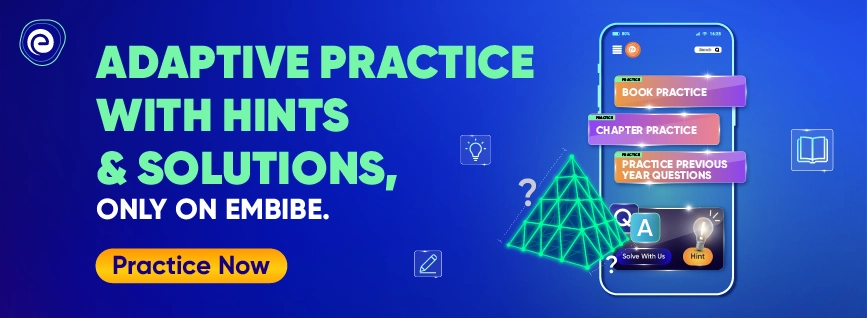- Written By
Aaron_K
- Last Modified 09-05-2023
How To Prepare Quantitative Aptitude for 2023 Banking Exams?
Quantitative Aptitude is a crucial banking exam subject that examines maths skills. IBPS PO, SBI PO, and RRB PO are competitive exams, and applicants must score well in the Quantitative Aptitude to rank well. Quantitative aptitude is crucial to passing India’s challenging banking exams. To succeed in the 2023 banking tests, start early. This article provides quantitative aptitude preparation recommendations for the 2023 banking examinations.
Preparing for Quantitative Aptitude for 2023 Banking Exams
Aspirants can check the below-mentioned preparation methods for the quantitative aptitude for the 2023 banking exams.
The first step in getting ready for a test is to know how it will be set up and what it will cover. The banking tests have several parts: math, reasoning, English language, general knowledge, and computer skills. Most of the questions on the quantitative aptitude part are about things like simplifying, number series, data interpretation, arithmetic problems, and algebra. If you know how the test is set up and what it covers, you can make a study plan that covers all the topics and ensures you get all the essential ideas.
2. Learn More About Maths
The maths part of the quantitative aptitude test is all about maths, so getting better at maths is important. Start by reviewing basic math skills, like adding, subtracting, multiplying, and dividing. Once you’re comfortable with these ideas, you can move on to more advanced themes like percentages, ratios, and proportions. Practise fixing problems in these areas until you can do them well.
3. Use Study Guides and Practice Tests
There are a lot of study guides and practice tests, both online and off, that can help you get ready for the maths part of the banking exams. There are practice questions, answers, and tips to help you do better with these study tools. Mock tests are like the actual test and give you an idea of the questions you will be asked. Use these study tools and practice tests to determine what you do well and where to improve.
4. Learn How To Manage Your Time
Any competitive test, including banking exams, requires good time management. You will have little time to answer all the questions, so learning how to handle your time is important. Practise quickly and correctly solving tasks to get faster and better at your work. Also, remember to put questions in order of how hard they are and how long it will take to answer them.
5. Use Tricks and Shortcuts
Time is vital in banking exams, so shortcuts and tricks can help you save time and solve tasks faster. Find out how to solve problems quickly and easily, such as finding square roots, cube roots, and percentages. Using these tips and tricks can save a lot of time and get better results.
6. Keep Up With What’s Going On in the World
Banking tests often cover current events, so knowing what’s happening worldwide is important. Read journals, watch the news, and look at websites about current events to find out what’s happening in the world. With this information, you’ll be better able to answer questions about general knowledge and recent events.
7. Stay Calm and Sure of Yourself
Lastly, keep your cool and be sure of yourself during the test. Stay calm if you get a tricky question or run out of time. Remember that everyone taking the test is in the same situation as you are and that freaking out won’t help you figure out what to do. Stay calm, take a deep breath, and pay attention to what is being asked. If you don’t know the answer, move on to the next question and, if you have time.
Summing Up
The quantitative aptitude part of banking tests is very important, so studying hard for it is important. Start studying early, know the format and scope of the test, improve your math skills, use study materials and mock tests, practise managing your time, use shortcuts and tricks, keep up with current events, and stay calm and sure of yourself.
FAQs on Preparing for Banking Exams Quantitative Aptitude Section
Here are some of the most frequently asked questions about how to prepare for the Quantitative Aptitude part of the 2023 banking exams:
Q: What should I pay attention to when studying for quantitative aptitude tests for banks in 2023? Ans: When studying for quantitative aptitude tests in banks, you should focus on topics like math, algebra, geometry, trigonometry, data interpretation, and data sufficiency. It’s important to know a lot about these areas and practise different questions from each one.
Q: How can I speed up and better answer questions about quantitative aptitude for banking tests in 2023? Ans: To get faster and more accurate, you should practise often and work on improving your ability to do maths in your head. You should also learn methods and tricks to help you solve problems quickly and easily. Taking practice tests or sample papers is a good way to learn how to handle your time.
Q: What books or other study tools should I use to prepare for quantitative aptitude tests in banking in 2023? Ans: Yes, several good books and other study tools can help you prepare for quantitative aptitude tests in banking. Some famous ones are “Quantitative Aptitude for Competitive Examinations” by R.S. Aggarwal, “Quantitative Aptitude for Banking and SSC Exams” by Disha Experts, and “Quantitative Aptitude for All Competitive Examinations” by Abhijit Guha.
Q: Should I join a coaching school to prepare for quantitative aptitude in banking exams in 2023? Ans: An answer is that it can be helpful to join a coaching institute if you need direction and a structured way to prepare. But you don’t have to go to a coaching school. You can also study independently with books, online tools, and practice tests.
Q: How much time should I spend studying for the 2023 quantitative ability tests for bank jobs? Ans: How much time you should spend studying for quantitative aptitude depends on how well you know the material and what number you want to get. Set aside two to three hours daily to study and practise. Also, it would be best to take practice tests often to see how you’re doing and where you can improve.
We hope that this article was helpful. Embibe wants you to do well on the test and wishes you the best. If you have questions about this piece or the test, please check out The Embibe app. We will be happy to help you.
Keep an eye on Embibe for the latest news about the 2023 Banking exam.








































